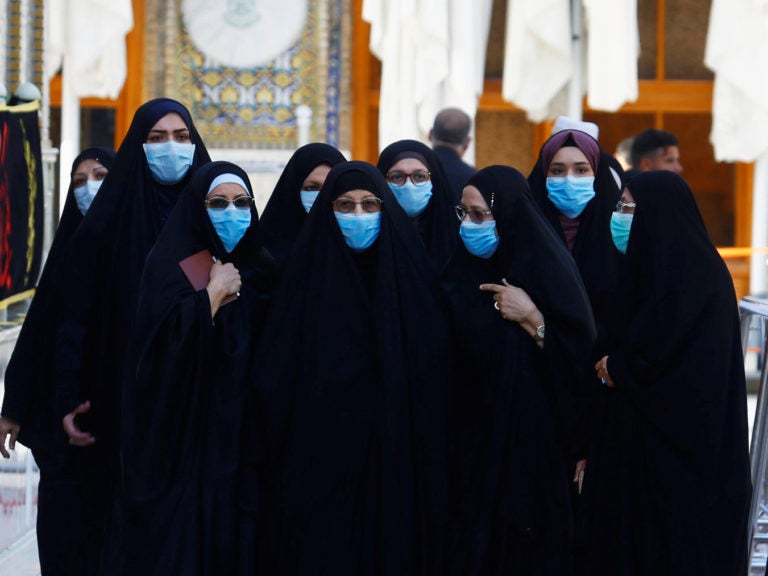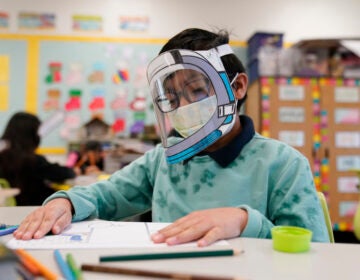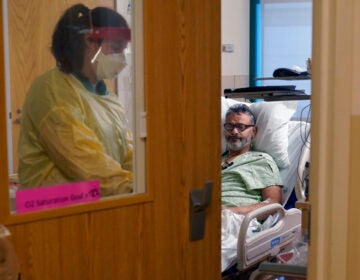Coronavirus: COVID-19 is now officially a pandemic, WHO says

With the coronavirus spreading in dozens of countries, the World Health Organization officially declared the COVID-19 viral disease a pandemic Wednesday. Here, Muslim women wear protective face masks at the Imam Ali Shrine following an outbreak of the coronavirus in the city of Najaf, Iraq. (Alaa Al-Marjani/Reuters)
The COVID-19 viral disease that has swept into at least 114 countries and killed more than 4,000 people is now officially a pandemic, the World Health Organization announced Wednesday.
“This is the first pandemic caused by coronavirus,” said WHO Director-General Tedros Adhanom Ghebreyesus.
Eight countries — including the U.S. — are now each reporting more than 1,000 cases of COVID-19, caused by the virus that has infected more than 120,000 people worldwide.
A severe outbreak in Italy has now caused more than 630 deaths there, and the country’s case total continues to rise sharply. It’s now at 10,000 cases, second only to China. There are 9,000 cases in Iran, and more than 7,700 in South Korea.
Those countries are all imposing drastic measures in an attempt to slow the spread of the COVID-19 illness, which has a higher fatality rate for elderly people and those with underlying health conditions.
“In the Americas, Honduras, Jamaica and Panama are all confirming coronavirus infections for the first time,” NPR’s Jason Beaubien reports. “Elsewhere Mongolia and Cyprus are also now reporting cases.”
The WHO declared the coronavirus outbreak a global health emergency in January, as cases surged in China, the epicenter of the outbreak.
As the outbreak has ballooned, so has speculation that the organization would raise its warnings about the virus to the highest level. But Tedros said WHO experts had determined that the scale of the coronavirus’s impact didn’t warrant the description. And he noted that declaring the outbreak a pandemic would raise the risk of a public panic.
Tedros and others had hoped the virus would be contained, citing data from China showing that the number of new cases there peaked in late January and early February.
Coronavirus symptoms and prevention
To prevent the coronavirus from spreading, the CDC recommends washing hands with soap and water for at least 20 seconds or using a hand sanitizer if a sink isn’t available. The World Health Organization says people should wear face masks only if they’re sick or caring for someone who is.
“For most people, COVID-19 infection will cause mild illness; however, it can make some people very ill and, in some people, it can be fatal,” the WHO says. “Older people, and those with pre-existing medical conditions (such as cardiovascular disease, chronic respiratory disease or diabetes) are at risk for severe disease.”
The most common symptoms of COVID-19, according to a recent WHO report that draws on more than 70,000 cases in China: fever (in 88% of cases); dry cough (68%); fatigue (38%); sputum/phlegm production (33%).
Shortness of breath occurred in nearly 20% of cases, and about 13% had a sore throat or headache, the WHO said.
9(MDAzMzI1ODY3MDEyMzkzOTE3NjIxNDg3MQ001))


![CoronavirusPandemic_1024x512[1]](https://whyy.org/wp-content/uploads/2020/03/CoronavirusPandemic_1024x5121-300x150.jpg)


